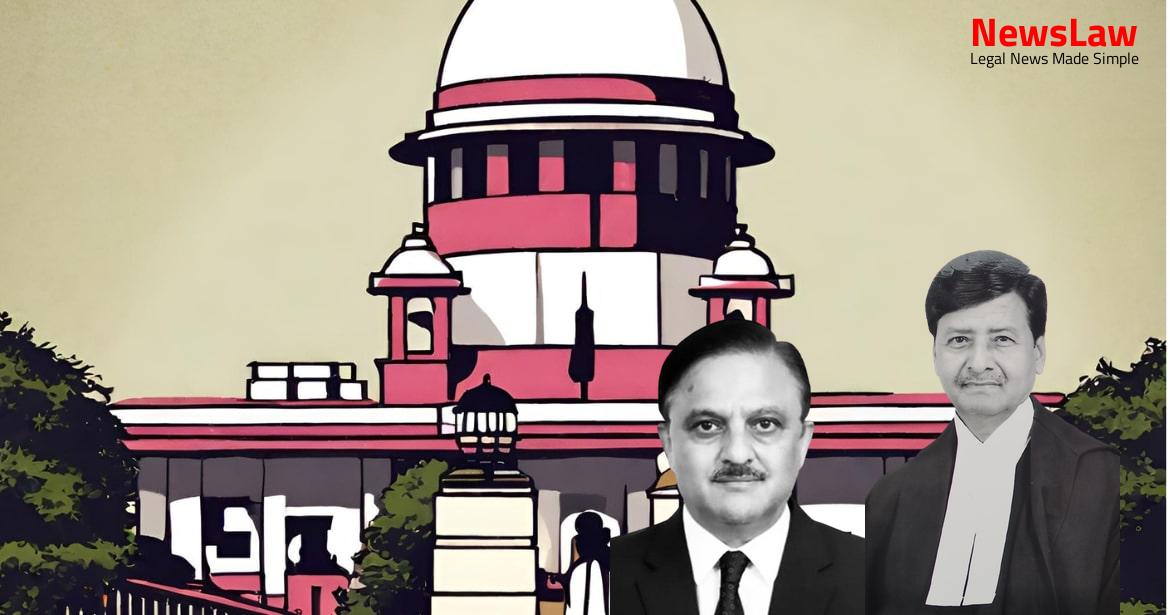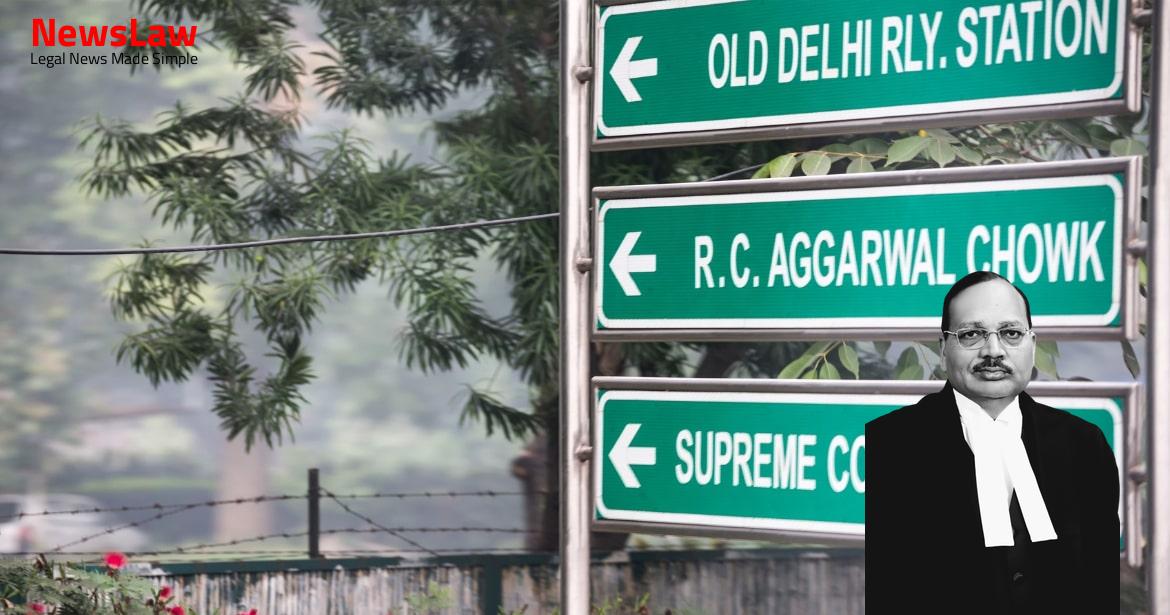Explore the complex legal analysis conducted by the court regarding the interpretation of the limitation period for filing objections under the Arbitration Act. This summary highlights how the court navigated the intricacies of determining when the period begins, emphasizing the importance of procedural adherence and legal clarity in arbitration cases.
Facts
- On 12.05.2018, a copy of the dissenting opinion was provided by the third arbitrator to the parties, even though the opinion was dated 27.04.2018.
- On 19.05.2018, both parties did not file any application to point out any clerical or typographical mistakes in the award or dissenting opinion.
- The signed copy of the arbitral award was provided to both parties on 19.05.2018, and the proceedings were terminated.
- The appellant corporation filed objections under Section 34 on 10.09.2018 challenging the award dated 27.04.2018.
- The Civil Court dismissed the application for condonation of delay on 14.02.2019, stating that the period of limitation starts running from the date the majority award was received on 27.04.2018.
- The objections under Section 34 had to be filed within 3 months, which expired on 27.07.2018. Even with a 30-day benefit, objections should have been filed by 26.08.2018, but were filed on 10.09.2018.
- The High Court affirmed the Civil Court’s decision to dismiss the objections based on delay.
- The appellant corporation contended that objections were wrongly dismissed on the ground of limitation and not on merits, stating that the term ‘arbitral award’ includes both the majority award and the minority opinion.
- Section 31(1) of the Act requires all tribunal members to sign the award, and Section 31(2) applies only to unanimous awards, not when there is a dissenting view.
- The time limit for filing objections under Section 34(3) relates to the entire arbitral award, not just the majority award, to avoid prejudice to the award debtor.
- The third arbitrator disagreed with the majority and would be rendering a separate opinion.
- Objections were dismissed due to delay as per Section 34(3) proviso.
- Court may entertain application within additional 30 days if sufficient cause is shown for delay.
- Appellant filed Appeal No 1954/2019 under Section 37 of the Arbitration Act.
- Matter was posted for correction on 19.05.2018.
- No application for correction was filed, leading to termination of proceedings.
- Time for filing objections expired on 26.08.2018.
- Dissenting opinion does not become an award merely due to styling.
- Application under Section 34 was filed after the extended period expired.
- Limitation period starts from the date of receiving the arbitral award.
Also Read: Analysis of ‘Cause of Action’ in Jurisdictional Transfer Petition
Issue
- The issue for consideration is the commencement of the period of limitation for filing a petition under Section 34 of the Arbitration and Conciliation Act, 1996.
- The question is whether the period starts from the date of circulation of the draft award or the date when the signed copy of the award was provided.
- Background facts include a Service Level Agreement dated 02.05.2011, termination by appellant on 16.10.2014, leading to disputes resolved through arbitration.
Also Read: Land Acquisition Compensation Determination Discrepancy
Arguments
- In the case of Axios Navigation v. Indian Oil Corporation, the Bombay High Court held that the view of the minority was relevant for the adjudication of objections under Section 34 of the Arbitration Act.
- The Respondents argued that the objections filed by the appellant corporation under Section 34 of the Arbitration Act are barred by limitation and should be dismissed on those grounds.
- It was contended that the dissenting opinion has been deemed correct by courts in various cases.
- Reference was made to the judgment in Ssangyong Engineering and Construction Co. ltd. v. NHAI, where the dissenting opinion was upheld as the correct view and affirmed.
- Respondent relies on Section 34(3) of the Act regarding objections to the award.
- Claims that objections must be filed within three months of receiving the award.
- Argues that the limitation period started on 27.04.2018 when the majority award was pronounced.
Also Read: Analysis of Limitation in Arbitration Proceedings
Analysis
- In arbitration under the Indian Arbitration and Conciliation Act, 1996, the validity of an arbitral award is contingent upon signatures of all members of the tribunal or a majority with recorded reasons for omission.
- The dissenting opinion of an arbitrator is not considered an award but merely an opinion under the Act.
- Section 31(5) mandates the provision of a signed copy of the arbitral award to the parties by the tribunal.
- The term ‘arbitral award’ in Sections 34 and 36 refers to the decision by the majority of tribunal members, not dissenting opinions.
- The date of receipt of the signed award is crucial in initiating various actions under the Act, including objections under Section 34 and termination of arbitral proceedings under Section 32(1).
- Signing of the award is essential to confer legal effect and finality, marking the conclusion of the arbitration process.
- Enforcement under Section 36 is only applicable to the ‘arbitral award’ rendered by the majority of tribunal members.
- An arbitral award encompasses the decision by the majority of tribunal members, finalizing the rights and liabilities of the parties in dispute.
- The arbitral tribunal must make the award within 12 months from the completion of pleadings as per Section 23(4).
- In arbitral proceedings with multiple arbitrators, decisions must be made by a majority vote of all members unless the parties agree otherwise as per Section 29(1).
- Section 34(3) sets a time limit of three months from receipt of the award to challenge it, with a 30-day extension under specific circumstances.
- Upon passing the final award, arbitral proceedings are terminated, and the tribunal becomes functus officio as per Section 32 and 29A(4).
- If a dissenting opinion exists in a three-member tribunal, it must be delivered simultaneously with the final award as the tribunal becomes functus officio.
- The mandate of arbitrators terminates if the award isn’t made within the specified time limits as per Section 29A(4).
- Signing the arbitral award is a legal requirement under Section 31 of the 1996 Act.
- Section 31(1) mandates the form and content of the arbitral award.
- Section 29(1) states that the decision of the majority of tribunal members constitutes the arbitral award.
- The dissenting opinion of a minority arbitrator can be relied upon to support submissions in proceedings under Section 34.
- The limitation period for filing objections under Section 34 starts from the date the signed copy of the final award is received by the parties.
- The period of limitation for filing objections only commences from the date when the signed copy of the award is delivered to the party seeking to set aside the award.
- Section 5 of the Limitation Act, 1963 does not apply to applications filed under Section 34 of the Arbitration Act.
- The statutory period of limitation for filing an application under Section 34 is three months, extendable by thirty days only with sufficient cause shown.
- If the objections are not filed within the prescribed period under Section 34, the award holder can move for enforcement of the arbitral award as a deemed decree under Section 36 of the Act.
- The period of limitation for filing objections is reckoned from the date the signed copy of the award was provided to the parties.
- In this case, the objections were filed within the prescribed period of limitation according to Section 34(3) of the Act when reckoned from 19.05.2018.
Decision
- The matter was posted to 19.05.2018 for parties to point out any typographical or clerical mistakes in the dissenting opinion.
- On 19.05.2018, the signed copy of the award, dissenting opinion, and original record were handed over to the parties and arbitrators.
- Judgment of the District and Sessions Judge dated 14.02.2019, and the impugned order of the High Court dated 11.12.2019 were set aside.
- Petition under Section 34 of the Arbitration and Conciliation Act, 1996 (Arb. Pet. No 316 of 2018) restored to the District and Sessions Judge, Hissar, Haryana for decision on merits.
- Proceedings were posted for 12.05.2018 where the third arbitrator pronounced his dissenting opinion.
- It was noted that the third arbitrator dissented and would deliver a separate opinion.
- Tribunal ordered the termination of the proceedings.
- Objections filed within the prescribed period of limitation under Section 34(3) from the date of receipt of the signed award.
- On 27.04.2018, parties were given a copy of the award to point out errors for correction on the next date.
- All pending applications were disposed of.
Case Title: DAKSHIN HARYANA BIJLI VITRAN NIGAM LTD. (DHBVN) Vs. M/S NAVIGANT TECHNOLOGIES PVT. LTD. (2021 INSC 140)
Case Number: C.A. No.-000791-000791 / 2021



